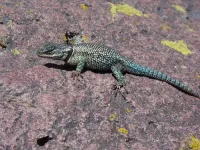(Press-News.org) Among adults with chronic kidney disease (CKD) enrolled in the Chronic Renal Insufficiency Cohort (CRIC), young age, Black race, and low levels of education and income were associated with lower likelihood of getting an annual flu shot.
Identifying risk factors for not receiving a flu vaccine (“non-vaccination”) in people living with kidney disease, who are at risk of flu and its complications, could inform strategies for improving vaccine uptake. In this study published in the American Journal of Kidney Diseases (AJKD), researchers led by Junichi Ishigami examined whether demographic factors, social determinants of health, and clinical conditions were linked to the status of not receiving a flu vaccine among people living with kidney disease and receiving nephrology care. The authors found that the pooled mean influenza vaccine uptake between 2009 and 2020 was 72%. Younger individuals, Black individuals, and those with adverse social determinants of health were less likely to receive an influenza vaccine. In contrast, those with diabetes, COPD, ESKD, and frailty were less likely to have the influenza non-vaccination status.
These findings have important implications. Their finding of <80% vaccine uptake (or only 44% of participants consistently receiving an influenza vaccine every year surveyed) indicates room for improvement in vaccine uptake for people with CKD. While it was unknown whether participants in this study received their influenza vaccines at a nephrology clinic (versus at primary care clinic, a pharmacy, etc.), the optimal role of nephrology care in promoting vaccination should be explored in future studies. Efficiency of vaccine efforts for people with CKD may be improved by targeting those who have barriers to vaccination (e.g., younger adults, Black individuals, those with adverse social determinants of health). To date, few data exist regarding the effectiveness of vaccination programs in nephrology care, outside of quality improvement projects in dialysis centers. Importantly, nephrology care may represent an important opportunity to increase vaccine uptake in patients with CKD by leveraging trusted relationships between nephrologists and patients. Additionally, involving patient-level stakeholders (e.g., family members, caregivers) may help reduce barriers and provide social support and accountability for preventive health care. Future studies should examine reasons behind vaccine hesitancy (e.g., concerns about side effects, inconvenient access to vaccination), so vaccination programs can be tailored to address these concerns.
TITLE: Factors Associated With Non-Vaccination for Influenza Among Patients With CKD: Findings From the Chronic Renal Insufficiency Cohort (CRIC) Study
AUTHORS: Junichi Ishigami, MD, MPH, Bernard G. Jaar, MD, MPH, Jeanne B. Charleston, PhD, James P. Lash, MD, Julia Brown, MD, Jing Chen, MD, MMSc, MSc, Katherine T. Mills, PhD, MSPH, Jonathan Taliercio, DO, Sheru Kansal, MD, Deidra C. Crews, MD, MS, Kristin A. Riekert, PhD, David W. Dowdy, MD, PhD, Lawrence J. Appel, MD, MPH, Kunihiro Matsushita, MD, PhD, on behalf of the CRIC Study investigators
DOI: 10.1053/j.ajkd.2023.06.007
END
Disparities in flu vaccine uptake persist in people with kidney disease
2023-09-18
ELSE PRESS RELEASES FROM THIS DATE:
A suit of armor for cancer-fighting cells
2023-09-18
In recent years, cancer researchers have hailed the arrival of chimeric antigen receptor T cell (CAR T) therapy, which has delivered promising results, transforming the fight against various forms of cancer. The process involves modifying patients’ T-cells to target cancer cells, resulting in remarkable success rates for previously intractable forms of cancer.
Six CAR T cell therapies have secured FDA approval, and several more are in the pipeline. However, these therapies come with severe and potentially lethal side effects, namely cytokine release syndrome (CRS) and neurotoxicity. These drawbacks manifest as a range of symptoms—from high fever and vomiting to multiple ...
Dana-Farber leads adaptive, efficient multi-arm phase 2 clinical trial for glioblastoma
2023-09-18
EMBARGOED: September 18, 2023 4PM EST
CONTACT: Nicole Oliverio, nicole_oliverio@dfci.harvard.edu, 617-257-0454
Boston – An innovative phase 2 clinical trial led by Dana-Farber Cancer Institute in collaboration with 10 major brain tumor centers around the country and designed to find new potential treatments for glioblastoma has reported initial results in the Journal of Clinical Oncology. While none of the three therapeutics tested so far improved overall survival of patients, this adaptive platform trial, the first of its kind in neuro-oncology, has the potential to rapidly and efficiently identify therapies that ...
New research highlights importance of equity in education
2023-09-18
A new study looks at the impact of learning environments on the academic success of racialized students. Compared to their peers, these students feel they have less control in their academic environment, less confidence and self-efficacy in their academic abilities, and weaker connections to other students and professors.
The University of Ottawa study underscores that higher education institutions must recognize and address the specific needs of their racialized student communities and create inclusive learning environments that better meet these needs. Failing to do so could affect the overall psychological well-being and academic performance ...
Cell therapy can reduce risk of death from COVID-19 by 60%, study shows
2023-09-18
The use of cell therapy to treat COVID-19 patients can reduce the risk of death from the disease by 60%, according to a systematic review and meta-analysis conducted by researchers at the University of São Paulo (USP) in Brazil, in partnership with colleagues in Germany and the United States.
Their findings are reported in an article published in the journal Frontiers in Immunology.
The review covers 195 clinical trials of advanced cell therapies targeting COVID-19 that were conducted in 30 countries between January 2020 and December 2021, as well as 26 trials with outcomes published by July 2022.
Cell therapy has come into increasingly frequent use in recent years ...
The pace of climate-driven extinction is accelerating, a UArizona-led study shows
2023-09-18
Climate change is causing extinctions at an increasing rate, a new study by the University of Arizona researchers shows. They surveyed populations of the Yarrow's spiny lizard in 18 mountain ranges in southeastern Arizona and analyzed the rate of climate-related extinction over time.
"The magnitude of extinction we found over the past seven years was similar to that seen in other studies that spanned almost 70 years," said John J. Wiens, a professor in the Department of Ecology and Evolutionary Biology at UArizona, ...
Nuclear medicine treatment cures lethal form of ovarian cancer in preclinical setting
2023-09-18
Reston, VA—A new 225Ac-DOTA-based pre-targeted radioimmunotherapy (PRIT) system has been shown to cure a highly lethal form of advanced intraperitoneal ovarian cancer in a preclinical setting with minimal side effects. Targeting the HER2 protein, which is commonly expressed in ovarian cancer, the therapy (anti-HER2 225Ac-PRIT) is a potential treatment for the otherwise incurable disease. This research was published in the September issue of The Journal of Nuclear Medicine.
Epithelial ovarian cancer is the most lethal ovarian cancer and frequently presents as advanced-stage disease, ...
Gene links exercise endurance, cold tolerance, and cellular maintenance in flies
2023-09-18
EMBARGOED FOR RELEASE UNTIL September 18, 2023 at 3:00 PM U.S. Eastern time
As the days get shorter and chillier in the northern hemisphere, those who choose to work out in the mornings might find it harder to get up and running. A new study in PNAS identifies a protein that, when missing, makes exercising in the cold that much harder—that is, at least in fruit flies.
A team from University of Michigan Medical School and Wayne State University School of Medicine discovered the protein in flies, which they named Iditarod after the famous long distance dog sled across Alaska, while studying metabolism and the effect of stress on the body.
They were particularly ...
Eureka baby! Groundbreaking study uncovers origin of ‘conscious awareness’
2023-09-18
Living things act with purpose. But where does purpose come from? How do humans make sense of their relation to the world and realize their ability to effect change? These fundamental questions of agency – acting with purpose – have perplexed some of the greatest minds in history including Sir Isaac Newton, Charles Darwin, Erwin Schrödinger and Niels Bohr.
A Florida Atlantic University study reveals groundbreaking insight into the origins of agency using an unusual and largely untapped source – human babies. Since goal-directed action appears in the first months ...
Study finds human-driven mass extinction is eliminating entire branches of the tree of life
2023-09-18
The passenger pigeon. The Tasmanian tiger. The Baiji, or Yangtze river dolphin. These rank among the best-known recent victims of what many scientists have declared the sixth mass extinction, as human actions are wiping out vertebrate animal species hundreds of times faster than they would otherwise disappear.
Yet, a recent analysis from Stanford University and the National Autonomous University of Mexico, published this week in the Proceedings of the National Academy of Sciences, shows the crisis may run even deeper. Each of the three species above was also the ...
An implantable device could enable injection-free control of diabetes
2023-09-18
CAMBRIDGE, MA -- One promising approach to treating Type 1 diabetes is implanting pancreatic islet cells that can produce insulin when needed, which can free patients from giving themselves frequent insulin injections. However, one major obstacle to this approach is that once the cells are implanted, they eventually run out of oxygen and stop producing insulin.
To overcome that hurdle, MIT engineers have designed a new implantable device that not only carries hundreds of thousands of insulin-producing islet cells, but also has its own on-board oxygen factory, which generates oxygen by splitting water vapor found in the body.
The researchers showed that when ...







